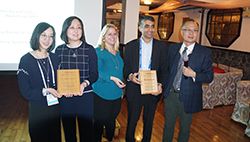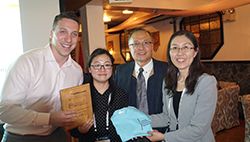Young Investigator Awards and Student Excellence Awards Presented at Pittcon
The Chinese American Chromatography Association (CACA) presented awards its Young Investigator and the Student Excellence Awards at the CACA annual dinner event at Pittcon 2019 in Philadelphia, Pennsylvania.
The Chinese American Chromatography Association (CACA) presented awards its Young Investigator and the Student Excellence Awards at the CACA annual dinner event at Pittcon 2019 in Philadelphia, Pennsylvania. The awards are presented annually to outstanding scientists and students who have made exceptional contributions to the development of separation science and its applications.
The two Young Investigator awards were presented to M. Farooq Wahab, and Emmi Zheng.
Left to right: Emmi Zheng (Nephew &Smith), Jenny Zhang (Agilent), Stephanie Rosenbert (AMT), M. Farooq Wahab (University of Texas at Arlington. Texas), and Perry Wang (U.S. Food and Drug Administration). (Photo courtesy of Instrument.com.cn.)

Wahab is a research engineer scientist in the Department of Chemistry and Biochemistry at the University of Texas at Arlington, Texas. He earned his PhD in analytical chemistry from the University of Alberta, Canada. He has made major contributions to the development of novel stationary phases for chiral, ionic, and hydrophilic compounds, has been published 35 times, has served as a reviewer for many analytical chemistry journals, and has won many awards.
Zheng, an R&D scientist in the Biotherapeutic Product Development Group of Smith & Nephew (Fort Worth, Texas), received her PhD in analytical chemistry from the University of Nebraska–Lincoln. She has developed novel methodologies for the characterization of biotherapeutics and drug interactions including methods in high-performance affinity chromatography. She has been published 26 times and has made numerous presentations.
Kellen DeLaney and Juan Bian won the two Student Excellence awards.
Left to right: Ed Faden (Mac-Mod), Juan Bian (The Ohio State University), Perry Wang, and He Yi (John Jay College). Not shown: Kellen DeLaney. (Photo courtesy of Instrument.com.cn.)

DeLaney is a graduate student at the University of Wisconsin (Madison, Wisconsin). She developed novel analytical methods for the characterization of biological systems including those that use capillary electrophoresis–mass spectrometry (CE-MS) as an imaging platform. She has been published 16 times.
Bian is a graduate student at Ohio State University (Columbus, Ohio). Her research in high performance liquid chromatography (HPLC), CE, and MS has focused on method development for the characterization of biosystems, including those using enhanced fluidity liquid chromatography and pressure-mediated CE. She had been published five times.
Advanced Materials Technology and Agilent Technologies sponsored the Young Investigator awards, and Mac-Mod sponsored the Student Excellence awards.
Awards Selection Process and Presentation
The selection process for the CACA awards is based on research accomplishments and innovations, the number of publications and their impact, and service record to the scientific community. [just a personal idea that it’s not always good to reveal who the committee members are.] CACA is a non-profit organization with a mission to promote networking and career development for its members. The organization frequently hosts webinars as well as dinner events at Pittcon and the HPLC conference to provide forums for sharing technical information in separation sciences and the development of collaborative relationships. For more information, please visit www.ca-ca.org.
Best of the Week: Food Analysis, Chemical Migration in Plastic Bottles, STEM Researcher of the Year
December 20th 2024Top articles published this week include the launch of our “From Lab to Table” content series, a Q&A interview about using liquid chromatography–high-resolution mass spectrometry (LC–HRMS) to assess chemical hazards in plastic bottles, and a piece recognizing Brett Paull for being named Tasmanian STEM Researcher of the Year.
Using LC-MS/MS to Measure Testosterone in Dried Blood Spots
December 19th 2024Testosterone measurements are typically performed using serum or plasma, but this presents several logistical challenges, especially for sample collection, storage, and transport. In a recently published article, Yehudah Gruenstein of the University of Miami explored key insights gained from dried blood spot assay validation for testosterone measurement.
Determination of Pharmaceuticals by Capillary HPLC-MS/MS (Dec 2024)
December 19th 2024This application note demonstrates the use of a compact portable capillary liquid chromatograph, the Axcend Focus LC, coupled to an Agilent Ultivo triple quadrupole mass spectrometer for quantitative analysis of pharmaceutical drugs in model aqueous samples.